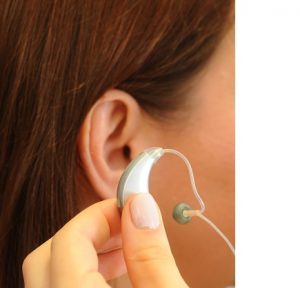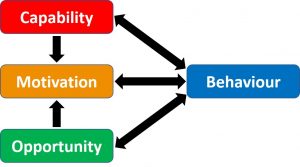April 13, 2021, by Adele Horobin
Help us understand how and why people use – or don’t use – their hearing aids
 Do you have hearing aids? Do you use them regularly, sometimes or not at all? We need your help!
Do you have hearing aids? Do you use them regularly, sometimes or not at all? We need your help!
Please complete our questionnaires to help us understand how we can make it easier for people to use their hearing aids.
Contact paige.church@nottingham.ac.uk to take part. Read below to find out more! Thank you.
Approximately 12 million people in the UK (1 in 5) have a hearing loss. Hearing loss causes communication difficulties. Hearing aids can help many people overcome these difficulties, which can be life changing. The NHS provides hearing aids free of charge to those who would benefit from using them. However, the non-use or irregular use of hearing aids is high, meaning that many people are not realising the full benefit. Similar to taking medications as prescribed by a doctor, regular hearing aid use is a positive health behaviour. Researchers at the NIHR Nottingham Biomedical Research Centre are using health psychology, and in particular health behaviour theory, to understand how we might improve the beneficial use of hearing aids by adults with hearing loss.
What is health behaviour theory?
Health behaviour theory is helpful for understanding how and why a particular behaviour occurs. A leading universal theory of health behaviour is the COM-B system. The COM-B system has three interacting parts; ‘Capability’, ‘Opportunity’ and ‘Motivation’. According to the theory, all three parts need to be present for a behaviour to occur.

Capability refers to how able a person is to engage in a behaviour, psychologically and physically. For example having necessary skills or knowledge.
Opportunity refers to external factors that make the behaviour possible, for example access to resources.
Motivation refers to an individual’s thinking processes that direct behaviour, for example decision making or goal setting.
We are using this theory to help us understand how different health behaviours are related to hearing aid use.

The GAIN project

Dr Emma Broome

Dr Helen Henshaw
Led by Dr Helen Henshaw and Dr Emma Broome, the GAIN project is a programme of research that aims to understand and address the barriers that adults with hearing loss might face in using their hearing aids, or in using them regularly.
Supported by the NIHR Clinical Research Network (including Research Audiologist, Paige Church), the first study in this research programme assesses hearing and health behaviours using questionnaires. Each questionnaire has been carefully selected to measure aspects of either Capability, Opportunity or Motivation, according to the COM-B system. The responses to these questionnaires will be used to predict hearing aid use measured 7 days later.
Results from this study will help us to assess whether the COM-B system can be successfully used to understand traits associated with hearing aid use, and how. This knowledge will help inform the development of tools to support first time hearing aid users to wear their hearing aid when they would benefit from doing so (study 2) and assess whether a large clinical trial of the effectiveness and cost-effectiveness of these tools can be carried out (study 3).
How can I get involved?

Ms Paige Church
Recruitment for study 1 is now open. If you own a hearing aid and would like to participate, please contact paige.church@nottingham.ac.uk to register your interest. Once you have registered you will receive the questionnaire via email or via post. Approximately 7 days after you have completed the questionnaire, a researcher will contact you by telephone or email (depending on your preference) at a preferred time to complete the final questions. You will receive a voucher on completion of the study as a small thank you for your time.
You can also sign up to the Biomedical Research Centre database to find out more about hearing research. Thank you!
No comments yet, fill out a comment to be the first

Leave a Reply